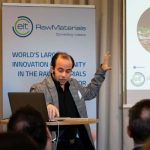Full partners
UiT Arctic University of Norway (Lead partner)
Norway
Fachhochschule Burgenland
Austria
G-Force
Slovakia
Technical University of Varna
Bulgaria
University of Alicante
Spain
University of Edinburgh
United Kingdom
Max. funding Phase 1
Max. funding Phase 2
Coordinated and supported by

Project description
The project will bring together a consortium of five higher education institutions (HEIs) and one business partner to review, assess and improve institutional innovation and entrepreneurship practices. The consortium’s vision for 2030 is to build capacity for innovation across HEIs, students, and businesses in the area of big data, environmental science, sustainability, and circular economy (referred to hereafter as the subject area).
This area has been assessed as a key strength of the consortium and is essential to society in order to understand, adapt to, and mitigate against the climate crisis and wider sustainability issues, building entrepreneurial and innovation capacity across all actors in society. The project benefits from an alignment with the goals of EIT Climate-KIC, EIT Digital and EIT RawMaterials, and its outcomes will support the strategic aims of these Knowledge and Innovation Communities (KICs).
The consortium benefits from high-level institutional commitment to improving innovation activities, as well as an impressive track record in building academia−industry partnerships, nurturing student and academic entrepreneurship, and delivering worldleading education and teaching. The project uses the EIT’s knowledge triangle model to build innovation capacity, supporting a knowledge-based and data-driven integration of research institutes and businesses to advance the use of big data in the subject area through a multidisciplinary approach.
The project has mapped four knowledge gaps between the components of the EIT knowledge triangle:
- a gap in improving the adoption of data and its role in the subject area across HEIs;
- a research−education gap;
- a business−education gap;
- a gap between society’s needs and all other components.
Bridging these gaps will help society to adopt a more informed and data-driven approach to decision-making, leveraging the full potential of big data in relation to climate change, sustainability, and the shift to circularity.
The consortium believes that the HEIs are best placed to become catalysts of change and innovation. Partnering with businesses and nurturing their entrepreneurial capacities is key to success.
Based on HEInnovate self-assessments, the consortium has identified six actions to improve its capacity in the subject area. These actions are aligned to the objectives of the project, the strengths and needs of each consortium member, and the strategic objectives of three KICs. The actions have a set of key performance indicators to measure the progress in project implementation over time with a plan to extend the financial support to run the activities beyond the project’s end.
Stakeholders who will benefit from the project include academic/ non-academic staff, students and start-ups, and society in general. The project will help position HEIs as engines of impact to lead society in the net-zero transition and support innovation in sustainability.
Project coordinator
 Tamer Abu-Alam, Assistant Prof. Sustainability Analytics, Faculty of Biosciences, Fisheries and Economics, UiT The Arctic University of Norway (contact)
Tamer Abu-Alam, Assistant Prof. Sustainability Analytics, Faculty of Biosciences, Fisheries and Economics, UiT The Arctic University of Norway (contact)
Project website
Project timeline



